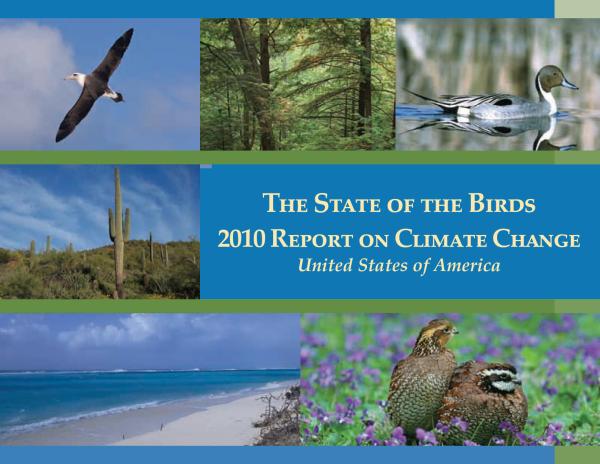Location
SPREP LIBRARY
Publisher
U.S. Fish and Wildlife Service
Publication Year:
2010
Publication Place
USA
Physical Description:
32 p.
Call Number
[EL]
Relevant Countries
Pacific Region
Material Type
Language
English
Record ID:
36328
Legacy PEIN ID:
76335
General Notes
National Geographic - 12 March 2010
Climate change poses a threat to 93 percent of Hawaii's bird species, said a report from orthinologists and environmental groups. Birds on Pacific and Caribbean islands are more susceptible to climate change because of their inability to move to new locations, said the report called "The State of the Birds: 2010 Report on Climate Change." The birds that will be the hardest hit by climate change will be ocean and island birds, whose habitat and food base are most tied to both a climate-dependent ocean biology and sea level, Pashley said. Hawaiian birds in particular, are already in deep trouble and may be looking at even more difficult circumstances, he said. All 67 oceanic bird species are considered vulnerable due to low reproductive rates, use of islands for nesting, and reliance on rapidly changing oceans, American Bird Conservancy said in its statement. Ninety-three percent of Hawaiian birds and 62 percent of all U.S. Pacific Island birds have a medium to high vulnerability to climate change. see Islands : State of the Birds - see also Oceans for a discussion of island-nesting seabirds.
Climate change poses a threat to 93 percent of Hawaii's bird species, said a report from orthinologists and environmental groups. Birds on Pacific and Caribbean islands are more susceptible to climate change because of their inability to move to new locations, said the report called "The State of the Birds: 2010 Report on Climate Change." The birds that will be the hardest hit by climate change will be ocean and island birds, whose habitat and food base are most tied to both a climate-dependent ocean biology and sea level, Pashley said. Hawaiian birds in particular, are already in deep trouble and may be looking at even more difficult circumstances, he said. All 67 oceanic bird species are considered vulnerable due to low reproductive rates, use of islands for nesting, and reliance on rapidly changing oceans, American Bird Conservancy said in its statement. Ninety-three percent of Hawaiian birds and 62 percent of all U.S. Pacific Island birds have a medium to high vulnerability to climate change. see Islands : State of the Birds - see also Oceans for a discussion of island-nesting seabirds.
Available online
Subject Heading(s)
Climate change - Effects - Bird populations - Oceania
Birds - Conservation
Birds - Protection
Abstract
In this 2010 State of the Birds report, we consider one of the greatest environmental challenges of our time, climate change. How will the impacts of climate change influence our bird populations and their habitats? Accelerated climate change as a result of human activities is altering the natural world as we know it, diminishing the quality of our environment. This report calls attention to the collective efforts needed to protect nature’s resources for the benefit of people and wildlife.
Location
SPREP LIBRARY
Publisher
U.S. Fish and Wildlife Service
Publication Year:
2010
Publication Place
USA
Physical Description:
32 p.
Call Number
[EL]
Relevant Countries
Pacific Region
Material Type
Language
English
Record ID:
36328
Legacy PEIN ID:
76335
General Notes
National Geographic - 12 March 2010
Climate change poses a threat to 93 percent of Hawaii's bird species, said a report from orthinologists and environmental groups. Birds on Pacific and Caribbean islands are more susceptible to climate change because of their inability to move to new locations, said the report called "The State of the Birds: 2010 Report on Climate Change." The birds that will be the hardest hit by climate change will be ocean and island birds, whose habitat and food base are most tied to both a climate-dependent ocean biology and sea level, Pashley said. Hawaiian birds in particular, are already in deep trouble and may be looking at even more difficult circumstances, he said. All 67 oceanic bird species are considered vulnerable due to low reproductive rates, use of islands for nesting, and reliance on rapidly changing oceans, American Bird Conservancy said in its statement. Ninety-three percent of Hawaiian birds and 62 percent of all U.S. Pacific Island birds have a medium to high vulnerability to climate change. see Islands : State of the Birds - see also Oceans for a discussion of island-nesting seabirds.
Climate change poses a threat to 93 percent of Hawaii's bird species, said a report from orthinologists and environmental groups. Birds on Pacific and Caribbean islands are more susceptible to climate change because of their inability to move to new locations, said the report called "The State of the Birds: 2010 Report on Climate Change." The birds that will be the hardest hit by climate change will be ocean and island birds, whose habitat and food base are most tied to both a climate-dependent ocean biology and sea level, Pashley said. Hawaiian birds in particular, are already in deep trouble and may be looking at even more difficult circumstances, he said. All 67 oceanic bird species are considered vulnerable due to low reproductive rates, use of islands for nesting, and reliance on rapidly changing oceans, American Bird Conservancy said in its statement. Ninety-three percent of Hawaiian birds and 62 percent of all U.S. Pacific Island birds have a medium to high vulnerability to climate change. see Islands : State of the Birds - see also Oceans for a discussion of island-nesting seabirds.
Record Created: 12-Mar-2010
Record Modified: 20-Sep-2022
